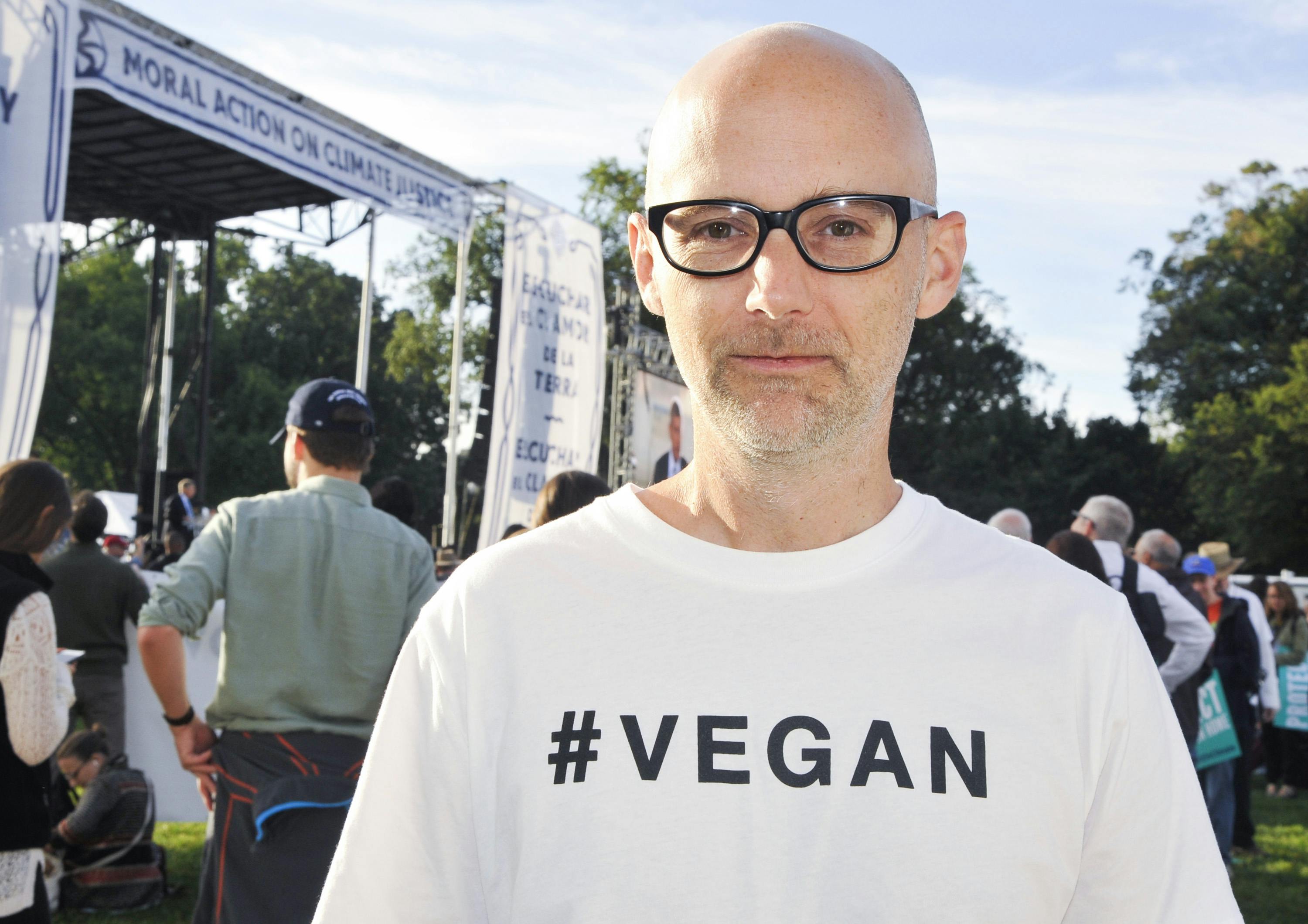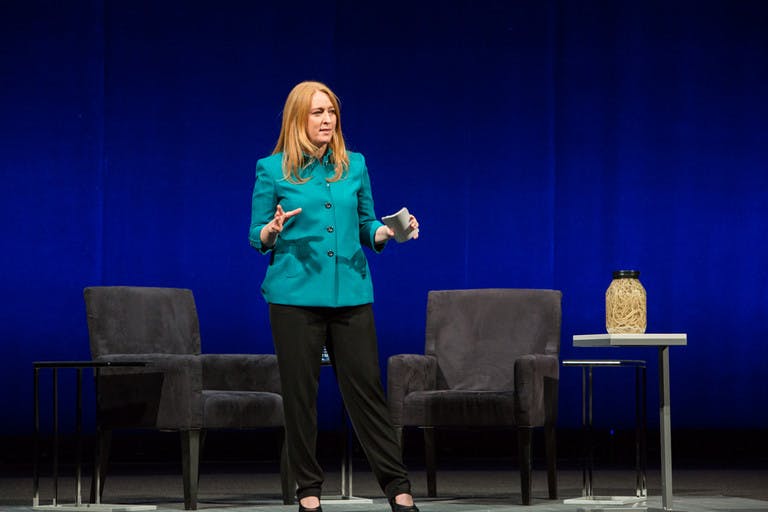Moby’s story is an unlikely one, to say the least. That he became a multi-millionaire celibate vegan living in Los Angeles by himself certainly didn’t seem pre-ordained by the circumstances of his early life. Born in Harlem, he was raised by a single mother after his father died in a drunk-driving accident when Moby was two years old. He spent his formative years in Darien, Connecticut, where he lived on food stamps until he was 18 despite the town’s upscale vibe. In high school he played with a punk band called the Vatican Commandos, then became obsessed with electronic dance music. He moved to New York City in 1991, armed with a single-pointed determination to make it as a DJ. Two years later, his debut single "Go" went top 10 in the United Kingdom, but he wouldn’t emerge as a bona fide star until 1999, when his fifth alum Play sold 12 million copies. Billboard magazine called him the King of Techno.
Moby made famous enemies—Eminem called him out—and famous friends (some of whom are still calling him out, such as Natalie Portman). Along with David Bowie, Moby created the “Area: One” tour featuring Incubus, Outkast, and Nelly Furtado among others, and for several years he lived a life of rock-star excess—sex, drugs, and mansions on both coasts. He drank so heavily that when his mother died of lung cancer in 1998, he was too hungover to attend her funeral.
Today, with 6 Grammy nominations and a total of 20 million albums sold, Moby has settled down and recently celebrated 11 years of sobriety. He’s also branched out, writing four books, including two memoirs, Porcelain and Then It All Fell Apart. (Moby, whose real name is Richard Melville Hall, is the great-great-great grandnephew of Herman Melville, author of Moby Dick, so perhaps the urge to write books was in his genes.)
A vegan for his entire adult life, Moby also runs and a popular vegan restaurant in Los Angeles called Little Pine, and now devotes a large amount of his time and money to animal rights and vegan activism. We spoke with him about his views on veganism and the future of food.
What did your parents like to eat? Were they interested in food?
My mom was a suburban hippie, so she ate, and fed me, early 70s suburban junk food: Frosted Flakes, Steak ‘Ums, Chips Ahoy, French bread toaster oven pizzas. She occasionally tried to eat and feed me tofu and brown rice. I only wanted to eat junk food, so when she tried to feed me tofu and brown rice, I threatened to report her to child welfare services.
What about your grandparents and uncles and aunts—what sort of culinary traditions were you raised with during family meals during holidays?
My grandparents were all old WASPs, so our Sunday dinners involved lamb chops and roast beef and vegetables that were barely recognizable as vegetables—gray green beans, lettuce covered in French dressing, etc. Although my grandmother had grown up in India—her parents were Presbyterian ministers—so she occasionally tried to sneak chutney and spicy pickles onto my plate. Again, I wanted junk food, not chutney.
What's the first memory you have of eating out at a restaurant? What did you order?
McDonalds, in Norwal,k Connecticut, 1970. I ordered hamburgers and fries and a chocolate shake, and I was vexed that I couldn’t eat this for every meal. My mother explained that it was both “unhealthy fast food” and too expensive, as we were on welfare and food stamps.
When you were a kid, what was a typical meal your mom would feed you?
My favorite meal was meatloaf with bacon and ketchup, egg noodles, and iceberg lettuce and cucumbers covered in cold Italian dressing.
When was the last time you ate meat?
I became a vegetarian in 1984, and then a vegan in 1987. So, the last time I ate meat was 1984, and the last time I ate an animal product was November, 1987.
When did you first become aware of food as an issue with ramifications beyond the personal?
When I read Diet for a New America by John Robbins. Vaguely ironic, as he was the heir to the Baskin-Robbins ice cream fortune.
Why did you decide to become vegan?
I’d been vegetarian for a while, but I realized that the same criteria regarding animals and health that led me to vegetarianism warranted my going vegan.
Veganism can be a choice based on personal health, global climate change, or moral concern for kindness to animals. Which of these three factors is most important? And are there other reasons that motivate you?
First and foremost my veganism is based on my belief that all animals are entitled to their own life and their own will, and that I can’t in good conscience be involved in contributing to, or causing, an animal’s suffering. But my veganism is also sustained by the fact that animal agriculture is the leading cause of rainforest deforestation, the third-leading cause of climate change, the leading cause of antibiotic resistance, and a leading cause of diabetes, obesity, heart disease, and many cancers.
You recently tattooed the words “VEGAN FOR LIFE” on your neck—why? Had you been thinking maybe you would switch back to grilled sausages in old age?
I’ve been vegan for 32 years, I don’t have a real job, I don’t date, and I guess deep down I always wanted to look like an ex-con.
What do you think the future of food is, versus what the future of food should be?
Even if animal agriculture didn’t involve animals, it would still make no sense as the future of food, as it makes people fat and sick, causes climate change, and is a horrible use of resources.
What is the single biggest misconception people have about vegans?
That we’re humorless and scrawny. I mean, I may be humorless and scrawny, but my fellow vegans are buff and hysterical.
What is the single best argument for veganism?
Live longer, save animals, save our species. Oh, and have more and better erections.
What are the downsides of being vegan, if any?
Living in a world that ridicules vegans.
If you weren’t vegan, what would your cheat meal be?
One single slice of Saint Marks pizza and a can of Pepsi.
In the last year or so, there’s been a big shift toward plant-based meat substitutes being adopted by Dunkin Donuts, McDonald’s and Burger King—where do you stand on the rise of brands like Beyond Burger and Impossible Burger?
Personally I don’t eat fake meat, but I love that it exists. I’m in favor of anything and everything that moves us away from torturing, imprisoning, killing, and dismembering animals for food.
Do you only date other vegans?
Well, I haven’t been on a date in over three years, so technically I don’t date anyone.
If you had a kid would you force him to be vegan?
Only if he wanted to sleep inside and have access to health care.
What is your main source of protein?
A combination of nuts, beans, whole grains, and dark greens.
What do you think makes your restaurant in LA, Little Pine, different from other vegan options in the city?
That we give 100% of our profits to animal rights organizations, and that we practice attraction, not promotion—meaning we “sell” veganism based on delicious food and wine and cocktails in a beautiful space.
If you were president, what policies would you promote regarding food?
Simply this; stop subsidizing any/all industries that do more harm than good. This applies to food, energy, guns, pharmaceuticals, chemicals, etc. It’s patently absurd that trillions of dollars in tax revenues goes to industries that make us sick or kill us.
Do you think all Americans should be forced by law to adopt a plant-based diet? Or do you believe people should be allowed to decide for themselves if they want to eat meat once or twice a year in small amounts?
As a first step, I think we should let meat and dairy cost what they actually cost, without subsidies. If a pound of beef cost $50—which is what it would cost without subsidies—that would go a long way towards solving the problem.
Do you feel that lions and tigers are morally inferior to animals that aren’t carnivores?
As a human who is largely divorced from truly natural cycles I don’t think it’s my place to judge creatures who ostensibly live within natural and time-honored cycles and systems.
What is one thing you don’t like about veganism you hesitate to admit?
The terrible puns.
Beyond the issue of veganism, what are the other issues related to food that keep you awake at night?
Antibiotic resistance, 80% of which comes from animal agriculture. If people aren’t terrified of antibiotic resistance then, simply, they’re not aware of antibiotic resistance.
The earth will end. Probably not tomorrow but someday. What’s your last meal?
One perfect walnut and one perfect organic orange. Because they’re delicious, but also fascinating when you really stop to look at them and think that somehow the earth took water and dirt and sunlight and DNA and made these phenomenal things.
If there was a party where past Moby could talk to present Moby about future Moby, what would you serve?
Very delicious chocolate cake.
Many people believe the anthropogenic era is almost over. How much of the ending do you think is because of our diet?
Looking at climate change and various pathologies, at least 50%. Factor in antibiotic resistance … then closer to 75%.
If in the future, there is a food revolution and humans subsist mainly on packs of astronaut food which we eat as pills, and everything is made of some technologically processed sustainable future food, but the entire idea of food as cuisine and culture went away, would that be worth it for you as a trade off?
I don’t know why we’d do that when food is already pretty perfect. But, um, ok?
What would a world without food politics look like?
80% less health care spending, 45% less climate change, 90% less rainforest deforestation, 50% reduction in most cancers, 50% reduction in diabetes and heart disease, 80% less antibiotic resistance. So, paradise?
What mistakes do people make when they first try to go vegan? For example, too many pre-packaged meat substitutes and processed foods that are nutrient deficient and high in harmful trans fats, starchy carbs, and sugars?
Yes, eating beige and white foods only. Being a French fry vegan isn’t terribly sustainable long term.
If you could choose just one dish for your daily go-to meal, what would it be?
A bowl of brown rice, kimchi, tempeh, walnuts, broccoli.
Pea protein—is it an essential component of a vegan diet? Or a passing fad in our opinion?
It’s a functional ingredient. Personally I never eat it, but I’m glad it’s there.
What extra steps do vegans have to take to get enough protein?
According to the Terminator, Arnold schwarzenegger, who is a vegan, “none.”
Many sports figures are now plant-based food fans, claiming that they have increased performance and energy after cutting out animal protein from their diets. Did you notice increased energy when you went vegan?
Without question. I’m 54, I hike and exercise daily, and I simply never get tired or sore.
Do you feel have a spiritual connection to animals, and if so can you talk about it a little?
I personally believe that humans are a broken species, separated from the divine or whatever life source you want to name, and that the rest of existence lives in a state of, for lack of a better word, “grace,” or innocence. I see all other animals and creatures, even the violent ones, as being in a state of connection with god, and when we visit violence and torture on them we are acting out as creatures separated from the divine. When you see an animal being abused or tortured or killed by a human, you can see, in their eyes, not just terror, but utter bewilderment.
Do you extend veganism to fluffy down duvets and leather items of clothing such as belts, shoes, etc?
Personally, yes. I don’t eat or wear or use any animal products.
Should vegan babies not breastfeed?
Vegan babies should absolutely breastfeed. To deny a vegan baby it’s mother’s breast milk is asinine and absurd.
To what extent do you think veganism has become a kind of proto-faith, taking the place of traditional belief systems in a post-religious culture?
Well, it’s a proto-faith in that it’s teleologically practical in terms of its ethics, and also leads to a connection to the divine in ways that can’t be achieved by torturing and killing innocent beings.
You recently produced a documentary about punk rock and veganism. Punk rock is usually seen as aggressive and thrashing and an almost violent musical assault, while veganism is often based on kindness towards animals and a generally peaceful and gentle approach to the earth and our bodies. Do you think there’s a disconnect between punk and veganism?
Aesthetically and musically, punk rock might seem incredibly aggressive, but more often than not the underlying ethos of punk rock is one of questioning that which is commonly accepted, whether it’s politics, mores, or the way in which we treat the vulnerable. The documentary I’m making looks at the history of punk rock and animal rights, and involves everyone from Joe Strummer to Rob Zombie, Kat Von D and Fred Armisen.
When will the movie be done? What is the title? Where can people see it?
Hopefully, I’ll have it finished by mid-2020. In terms of title or when it’ll be available to be seen, I have no idea.
You now donate 100% of the proceeds from your music sales and your restaurant to charities for animal rights. How does working and being creative with no personal profit motive affect your creative process?
Of course, I have an ego, and a desire to be comfortable, but for me activism is simply much more important and compelling than any of my small, ego-fueled concerns. And the wonderful knock-on effect of working in order to give money to charity is that it’s enabled me to be creative simply for the love of being creative, as I can’t personally profit from my creativity.











